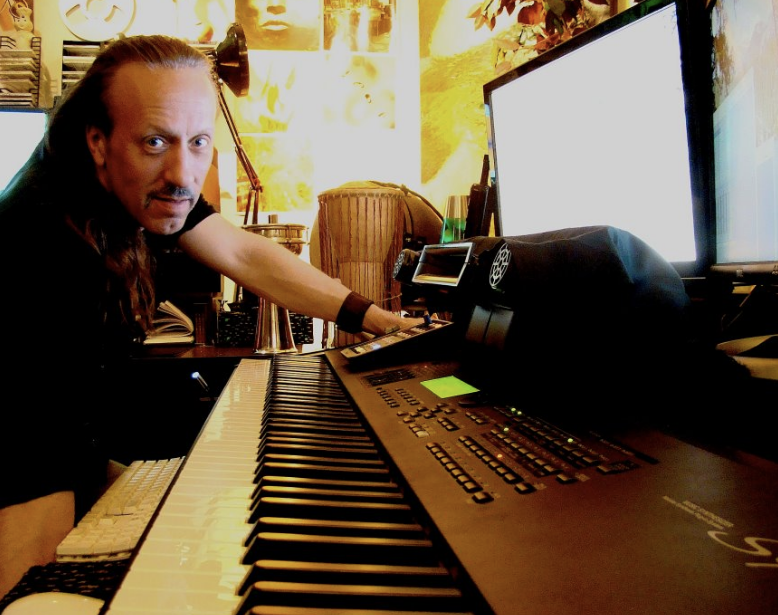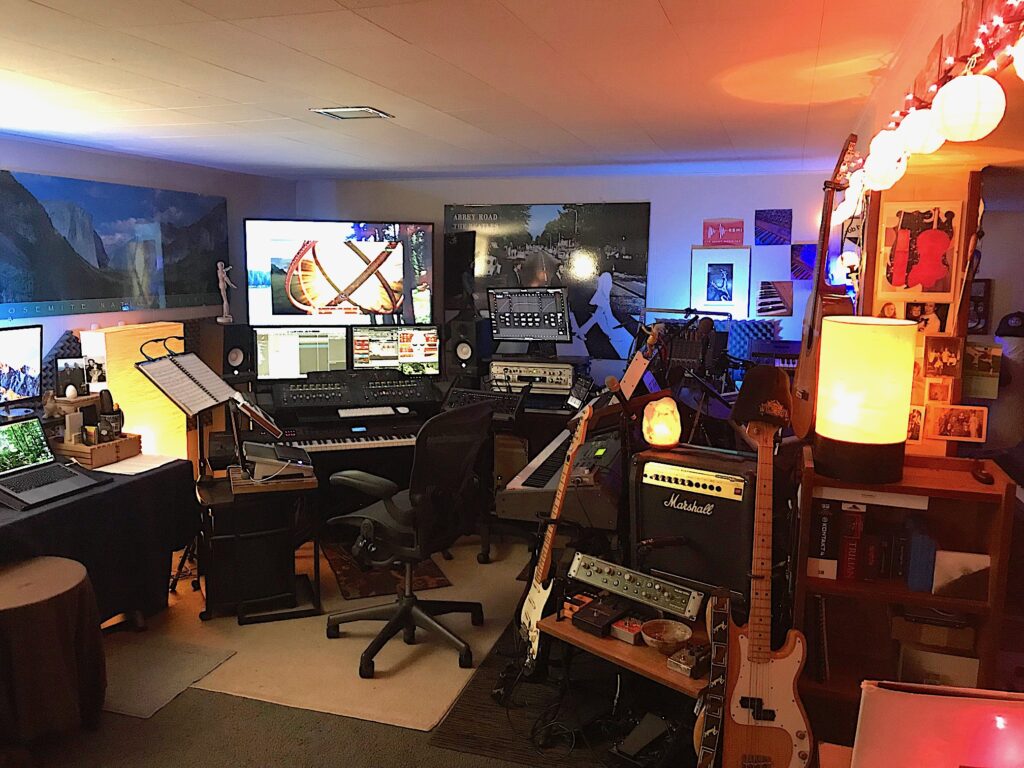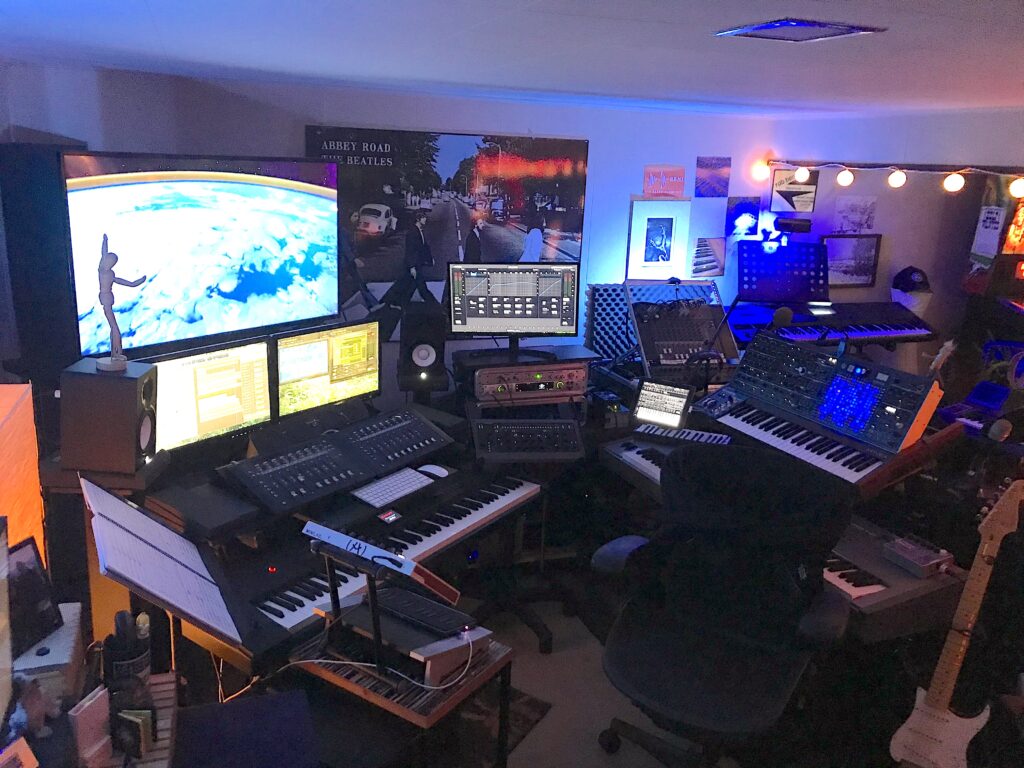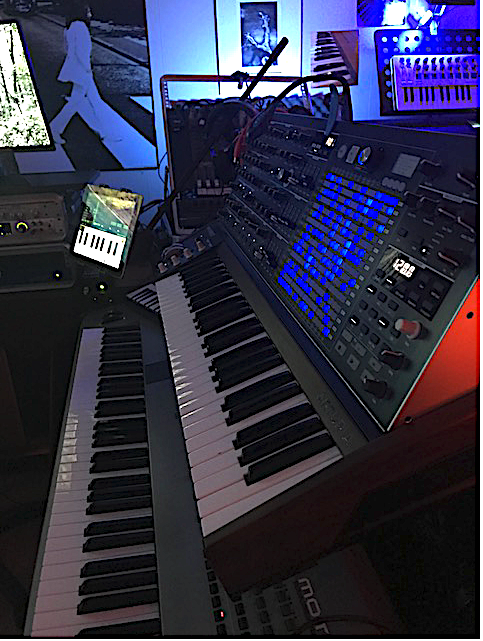 Hello Composers, Mike here! =)
Hello Composers, Mike here! =)
If you compose music with the purpose of making money, you are running your own business. It is really that simple. And you want to make your dream and passion for music, into a a full time living, right?
Great, because today I have the great honor of sharing my interview with Rob Berry (in the picture), who has over 3 decades of experience running his own business as a composer. Let’s dive in! =)
1. Hello Rob, what is your background, story and journey of starting and running your own business as a composer?
Hi Mike – thanks for asking me to do this. I was raised in a house full of music – Dad was a wonderful pianist, Mom a violinist and music teacher, and both were University trained.
I became interested early on, and Dad taught me piano from age 7, which I liked and needed, but the real fun came when I begged him to teach me ‘chords’ – theory and harmony.
I knew early on that I wanted to be a multi- instrumentalist, too, as keyboards and synths fascinated me, but I also pursued the percussion route, playing traditional percussion and drum set as well as jazz/rock/pop keyboards.
I played in rock and jazz and R&B groups through school – at Univ. Of Illinois, where I received a Bachelors in Composition and Univ. of Miami where my Masters was in Media Writing and Production.
While at U. of I. I played in jazz bands, orchestras, percussion ensembles, even steel drum bands. At those 2 schools I had both traditional composition background AND cutting edge writing/ production experience – and both schools had incredible players and teachers (many friends I played in groups with went onto very successful careers, some who you may know!).
I had wonderful studio experiences growing up: my friend built his own 8 (then 16) track studio in 1980, and I cut my teeth in there, learning to produce with my friends, and play keyboards and percussion on others’ projects.
After grad school, I headed back to Chicago and entered the ad music scene with a company called Com/track, the biggest ad music house in Chicago. We had 3-4 recording sessions – in real studios – going every day with the best of the best players and singers in the city. High pressure and worth every minute, though not easy.
Remember, this is back 1986-7, pre- Pro Tools – although the people I worked with had large Synclavier systems, and we were just starting to delve in Mac-based sequencing.
Back then, if a budget blew up, it was on the producer, and you better know how to steer it back on course (I did my Master’s thesis about some actual Chicago sessions that happened, from phone call to tape handoff, and what happened when problems arose and what I did to abate them).
From there I formed my own company with a partner, Airplay Music, and did music like Cap’n Crunch cereal for several years (with real players and studios, again).
As the ad biz waned, I taught music at a local college and learned new skills there. In 1996, I joined Williams/Bally/Midway to make pinball, slots and video games.
This was another period of training – in a different medium, as games are very different than ads. I stayed with them for several years, made many connections and learned about games so much that I am now known in certain circles for my game sound.
I now run my own business, Rob Berry Music Inc., with my son writing for me in his studio outside of Boston. We have customers in 7 time zones and are currently doing a good chunk of our business in social gaming – slots and ‘gambling’ type games for companies such as Zynga, Bally, Caesar’s, and a number of other companies who produce online content.
2. How did you manage to stay in business and thrive over such a long period of time?
 What I learned long ago is that if you don’t adapt, you wither and die. The music business has changed drastically over the past 30 years.
What I learned long ago is that if you don’t adapt, you wither and die. The music business has changed drastically over the past 30 years.
When I came in, the ad business was thriving down in Chicago. When I started out working for Com/track, we were doing multiple sessions a day with enormous budgets – real players, singers, engineers and studios.
Everyone was making great money, singing on spots, playing on multiple sessions and making residuals. With the advent of Pro Tools – things changed. A lot. And this was in a relatively short period of time.
Studio work dried up as ad agencies realized they could get it done cheaper, in house or virtually from a smaller provider. The days of the 24 track sessions disappeared. I dug into the virtual world as a keyboardist and synth geek, and honed my craft there.
I watched it changed and started to familiarize myself with Pro Tools and other digital DAWs. In 1996 I got an offer for a job at a games company, and though initially I wasn’t thrilled to take it, I dug in and learned that medium and developed great respect for it.
Pinball was king in Chicago, and right across the street Midway was making games like Mortal Kombat and NFL Blitz. But then the games industry morphed too – as the pinball I was making moved to casino games, and the casino games morphed into online entertainment.
Each time I have tried to see where my services were most needed. I was fortunate in that I had a background which allowed me to go a number of ways, as opposed to some friends who did not diversify as much and had to find other means of income besides music. The people I have met and worked with along the way have been instrumental in becoming customers and helping me build my business.
3. I am a huge believer in multiple sources of income, and “passive” income. What are your thoughts on this subject?
I have done quite a bit of writing, as well as playing and singing on commercials where I received ‘passive’ income (residuals), and still have some BMI income, but the bulk of what I do these days is fee-based.
When a company approaches me, they already (usually) have an idea who I am and my level of experience. If they are interested, I sometimes provide them with a Rate Sheet, which outlines the basic elements that slot/ gambling games have and what the price is for each.
I do this rather than ‘all-in-one’ pricing, as I have found that there is too much back and forth, additions and revisions, and the by-the-asset method keeps everyone honest. I am a BMI writer, and have had music on TV shows all around the world (I wrote for libraries for a couple years as well).
The amount of money derived from passive income, however, in the library world at least, requires an enormous output to create meaningful income. Even with all the tracks I produced a few years ago, I only see a few hundred dollars in royalties (and BMI royalties can take a while to deliver – the really successful library music composers are cranking out multiple tracks daily).
Here and there I have seen some publishing fees from big band or jazz vocal compositions and arrangements I have done for Kjos Music or Univ. of Colorado press, but I haven’t pursued that kind of writing/publishing in quite some time.
4. What can we as composers do to increase the “dollars per minute” we get paid for the music we compose for any type of project? ROI to speak in business terms.
 First off, if you compose for hire – e.g. like I do, providing music and audio for any kind of product or where you are composing to have materials approved – you have to ‘train’ your customers how to give you what you want and need.
First off, if you compose for hire – e.g. like I do, providing music and audio for any kind of product or where you are composing to have materials approved – you have to ‘train’ your customers how to give you what you want and need.
Once again, going back to my thesis (some of it based on pro ad work), you kind of have to ‘lock down’ the customer along the way. In my work now, I have customers all over the world – so there are sometimes cultural differences and language barriers to consider (though this isn’t too often as most are English-speaking).
It is imperative that my customers give me the most info possible: artwork, links to music style references (SUPER important), a list of assets (I have to have this first anyway to give them an estimate), and as we start the project, things like a video of gameplay accompanied by a list of features in the video (timings) and what they need for that asset (is it a loop? A fanfare? Does it need sound design as well as musical treatment?)
The more times I have to submit an asset for approval, the less money I make on that asset (time is money is very true) – so it is crucial that I get lots of info before I start, and that I lock down the customer along the way to commit to approvals.
If we go past 3 versions, one of us is doing something wrong. It happens, but too many revisions may mean that the price goes up a bit. To me it is all about managing customer expectations and delivering high quality goods.
Deliver at or below cost, and early if possible. Clients tend to appreciate those kinds of positive things – but unfortunately, they remember the negative things first if something goes wrong. So managing and exceeding customer expectations is key.
5. Networking and making friends in the industry is of course of great importance. Do you have any tips on networking?
This is perhaps one of THE most important pieces in building a business. I don’t have a ‘Rob Berry Music Inc.’ website, because I have not needed to up to this point. If the time comes, I have owned the domain name for years, and will have a buddy put it together for me.
But my two sources of deriving connections have been 1) past connections, in the ad world, music scene, game world and especially the gaming (casino) world, where I am known as a specialist, and 2) LinkedIn, which has been a remarkable tool for generating business.
Never, ever burn bridges. Through my career, I have had to work with all sorts of powerful people, some wonderful, others difficult or egomaniacs or studies in mental health!
Seriously, in the ad world, and for games, you work with singers, musicians and voiceover talent who are at the top levels, sometimes celebrities of all kinds in voiceover and video sessions, picky creative people, audio directors – and what I learned is that if you treat people with respect – not starstruck adulation, but as professionals there to get a job done – then the end result is far superior than inserting any ego into the mix.
I don’t get flummoxed by fame (though I have been wowed by extraordinary talent!). I am there to do
my job and the ‘talent’ is there to do the same. People remember when things go poorly – so in part this relates to ‘making friends’. Be easy to get along with and be a pro. People WILL remember that as well, and call you back.
Networking is about relationships. It’s about reaching out to people and saying, ‘Hey, we’re here, and ready to give you some amazing music/audio/ voiceovers, and we can do it with killer customer service.’
One of the audio directors for a company I work for, Zynga, is Chris Granner, a legend in the pinball audio world. Chris and I have known each other for thirty-seven years – we were both comp majors at U of I – and only back in 2013 did we interface once again and now talk weekly.
It is amazing how many people I have in my work life who go back to many areas of my career with other companies and other projects! The world is indeed small, and is getting flatter too.
6. Let’s talk about gear and software. What are your go-to tools in your studio?
Oh, I love my toys. I have been a gear geek since as far back as I can remember. I have a Mac-based system that I purchased about 8 years ago after getting out of corporate America and striking out full-time with Rob Berry Music Inc.
I use a Mac Pro 8 core, loaded with RAM and drives, and my go- to DAW is Logic Pro X. My audio interface system is an Apollo 8 and Dangerous Music D-Box, which I have connected to use the summing (but D-Box is most often used to mono quickly and A/B mixes).
I use 2 Artist Mix controllers as my ‘mixers’, and Softube Console 1 to dial in compression and EQ (lovely the way it works with UAD, my fave plugins). Monitors are Adam A7X and Yamaha HS5s, as well as a custom audio unit from a Bally gaming device given to me by Willie Wilcox, drummer extraordinaire and head of audio at Bally.
As a keyboard player, I have a wide variety of keyboards – including my father’s Steinway B which I had moved into the house last year and refurbished – incredible.
I use a Roland RD-800 as my main controller, but sometimes turn around in my chair to use my Yamaha Motif 8. Both have different feeling keyboards – and for certain things I like the wheel on the Motif rather than the joystick of the Roland.
 I also bought an Arturia Matrixbrute last year which I adore (I go back to using Moog modular gear at U of I and U of M, so love the whole matrix modulation concept).
I also bought an Arturia Matrixbrute last year which I adore (I go back to using Moog modular gear at U of I and U of M, so love the whole matrix modulation concept).
I also have some vintage keys: Minimoog (original 70s!), Hohner D6 clavinet, Emulator EII, a Generalmusic S3 (which still sounds amazing on certain things) and a couple controllers like M-Audio 49 key (if I need to go out live), Arturia Minilab mkII and ROLI Seaboard.
I like different controllers for different applications. I also have a Roland electric drum kit and SPD-11 drum pad to track drums sometimes (or just play on a break! Important to have fun and playtime in the studio IMO).
For mics I use a Warm Audio WA-47 through a Warm Audio WA73-EQ. I also have a Rode NTK, Share SM81, and a few dynamic mics for various purposes. I use a real Strat, a real Fender P-bass and other stringed instruments quite often, as well as real percussion.
Software … I love my libraries and sounds and am a bit of a plugin junkie. Besides Logic I use a full compliment of sounds for any requirement, since I don’t know what style of music the next day brings.
Logic, of course, along with E/W Composer Cloud (though I own several E/W titles, I subscribe to this service for peace of mind if I need something really special), most of the Cinesamples libraries, Kontakt & Komplete 10.
Various Kontakt libraries like Rev, and Signal from Output and the Shake/Shimmer/Strike and Riff Generator from In Session Audio, Symphobia 1-3 and Swing series, Superior Drummer, Spectrasonics Omnisphere, Trilan, Stylus, Keyscape, UVI World Suite, Arturia 6 collection, Serum, and many more … plus a bunch of UAD plugins, mastering things like Ozone and a few secret weapons I choose to keep to myself.
Much as I like to share, I think it is wise to keep a few choice secrets within the company! I have found a few things that I believe really make my audio shine and have taken lots of time to search those out. I am blown away by all of it, as I remember the beginnings of synths and studios and all we used to have to go through to get what we wanted.
And as an orchestrator – I am in heaven. In the past if you wanted to hear an orchestra you had to hire an orchestra. While the virtual world is not the real thing, it serves as a mighty substitute to those of us who love woodwinds and brass and cinematic music.
7. Anything else you want to say to your fellow composers, words of wisdom and motivation perhaps?
I would say more than ever it is imperative to learn craft, and now composers have more than ever to learn. In the old days (I am well into my 50s, full disclosure) as a producer, e.g. in the 80s and early 90s – I would leave the engineering duties to a recording engineer.
Now, we as composers not only have to know the craft of composing and arranging and orchestration, but also computers and plugins and engineering/mixing – not to mention any other peripheral skills needed to code etc. for a video game company.
We have to know about computers, upgrades, MIDI, mixing, mastering – exhausting! The composer/producer knowledge base has to be larger than any time I can remember.
If you want to do what I do, it can be daunting to enter the marketplace and promote oneself as someone who can produce in any style and deliver quickly. As much as I would like to say there is a magic bullet, there is not.
It comes down to craft, and time spent DOING. Writing, looking at scores, listening to recordings, mixing your tunes over and over and over again, learning how to use EQ and compression responsibly … there is so much.
You first must be sure that you enjoy it immensely – because to be good at it you MUST spend lots of time doing it. And getting it wrong. I listen to some mixes from a few years ago and just cringe, they are so bad. I had to take time to watch videos (like yours!) and read books and talk to engineers and other composers about how they did certain things.
And work hard – but remember to take time to play, rest, balance. I have had to learn the hard way sometimes that there is more to life than working 12 hour days and making money. Moderation is important, even with work.
I also love the phrase, maybe it was Confucius who said, ‘If you love what you do, you’ll never work a day in your life.’ I am excited pretty much every day I go into my studio, and consider myself extremely fortunate because of that. I never lose sight of that fact and give thanks every single day for my gifts and opportunities.
8. What are your goals for your future journey in music?
One of the things that is a real challenge for me is the desire to compose my own music when I have spent the entire day composing for others.
For this reason I am working very hard at my business now, and helping my son to build his part of the business as a composer/audio designer with the idea that I will gradually taper down my workload over the next few years, and increase my time spent creating my OWN music.
I still have a lot of pieces I have started and am working on currently – it isn’t like I don’t write for myself – but I want to spend lots more time doing it, recording with the many, many musicians I know from being in the Chicago music scene for over 30 years, that kind of thing.
I also will be looking to move into a house in a more remote location with a dedicated studio structure – think house in the woods with a ‘studio shed’. There will also be a studio makeover of sorts at that time I hope – as the new Mac Pro comes out.
I also want to make sure the structure is treated acoustically and has very clean power and fast networking, and want to have a RAID array for new sound libraries, vocal booth, custom desk … It is an exciting project to look forward to! In the meantime, I have my current wonderful studio, which I run out of my house outside of Chicago Illinois.
9. What’s your website, social media etc?
No website, as mentioned above – but my LinkedIn profile is here, which outlines my career experience. I will make sure to let you know if an RBMI website gets constructed!
In the meantime, however, I can be found on LinkedIn at this location: https://www.linkedin.com/in/rob-berry-2855b522/
This includes a history of my career and a few examples of some work I have done.
Thanks for the opportunity to share!
